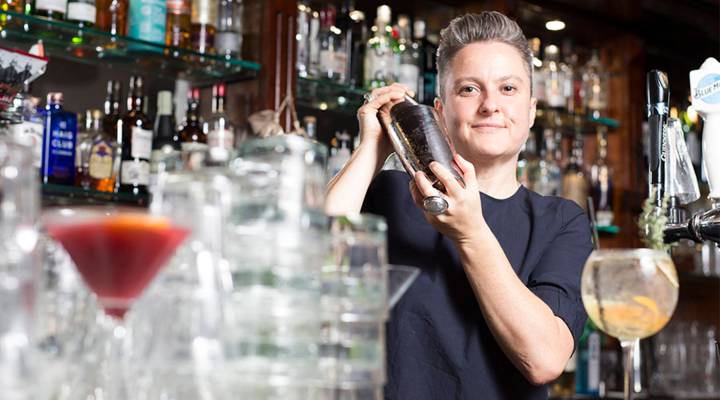
In Dry January, high demand for low-alcohol drinks

Last month was Dry January. In Britain, where the idea of abstaining from alcohol for a month originated, some 4 million people participated this year, an increase of 33 percent over last year, according to Alcohol Change UK, the leading British charity combating harm caused by alcohol. Avoiding booze is becoming more popular in the United Kingdom, and not just in January: More and more young Brits are giving up alcohol for good with the result that 20 percent of 16- to 24-year-olds now describe themselves as “teetotal.”
This albeit small non-drinking trend in a country that is well known for its hard-drinking culture is creating some business opportunities.
Five years ago, Catherine Salway and her partner, Andrea Walters, spotted a gap in the market and launched their first alcohol-free restaurant bar in London. But they did so in the teeth of considerable skepticism from friends and colleagues.
“People said: ‘An alcohol-free bar and restaurant! Are you guys mad? Why would anyone want to go there?” Salway told Marketplace. “People said: ‘For the sake of your profit and our enjoyment, you must serve booze!’ But we wanted to create a place where people could socialize without harming their health” Salway said.
The two entrepreneurs were determined to create the healthiest eatery in London, avoiding what they call “toxins and temptations, like meat, dairy products, chemical additives, sugar and especially alcohol!”
They called their brainchild Redemption, which might suggest a rather preachy and straight-laced attitude toward booze. But Salway, herself a pastor’s daughter, insisted that she and Walters are not holier than thou.
“We’re not clean-living, perfect ladies,” she said. “It’s been our redemption we’re talking about here. We’re just giving people a chance to cleanse. But nobody’s perfect. In fact, in order to be redeemed, you have to have sinned, right?”
The two have certainly been vindicated. They now have three Redemption restaurant/bars in London, and the business is flourishing.
Another business cashing in on the drift away from alcohol is Nirvana, a microbrewery in east London, the U.K.’s first alcohol-free craft beer producer. The owner, Becky Keen, was inspired to launch the business two years ago by her father.
“He’s a recovered alcoholic who’s been drinking alcohol-free beer to help his recovery. But he was complaining about the products that were available. And so my brother and I decided to try to make something better. Now my father tests all our beers. He’s our No. 1 customer,” she said. Business is brisk. Nirvana is producing several hundred thousand bottles a year and Keen has plans to expand.
Less than a decade ago, there were only two or three alcohol-free beers on sale in the U.K.; now there are hundreds, and some of them are very good indeed. Some have even beaten full-strength alcoholic beers in international competitions.
“The big brewers are getting in on the act, and that’s helping alcohol-free go mainstream,” said Laura Willoughby, co-founder of Club Soda, a group that advises people on moderate or mindful drinking and tries to persuade the drinks industry to cater to alcohol-avoiding customers. The message appears to be getting across.
“This January, you couldn’t pass a bus stop in London without seeing an advert for one or another alcohol–free beer,” Willoughby said. “So the market’s adapting, the big boys are beginning to bring new brands to market very quickly. And so we’re now seeing this rise of an alcohol-free drink sector.”
It‘s still only 10 percent of the whole drinks market. But it is the fastest-growing segment and includes alcohol-free spirits and wine as well. Dr. Richard Piper of Alcohol Change warmly applauded this development.
“We’re very excited about this growth in the low-alcohol, no-alcohol market because we see it as a very important element in attracting people to healthier alternatives,” Piper said.
The alternatives could be economically healthier, too. Piper pointed out that quite apart from the human and social damage caused by alcohol abuse, the financial cost in Britain’s state-funded health care, policing and other public services runs to a staggering $13 billion a year.
There’s a lot happening in the world. Through it all, Marketplace is here for you.
You rely on Marketplace to break down the world’s events and tell you how it affects you in a fact-based, approachable way. We rely on your financial support to keep making that possible.
Your donation today powers the independent journalism that you rely on. For just $5/month, you can help sustain Marketplace so we can keep reporting on the things that matter to you.












